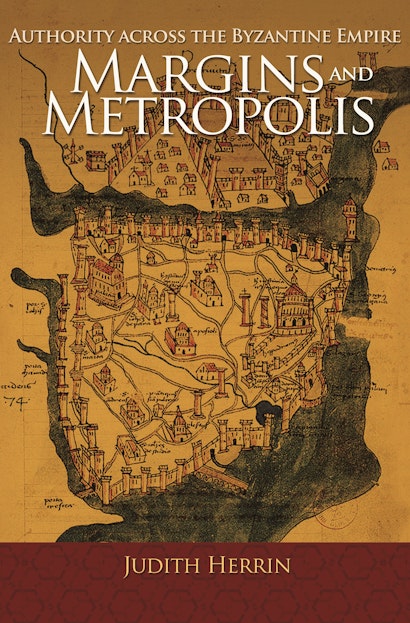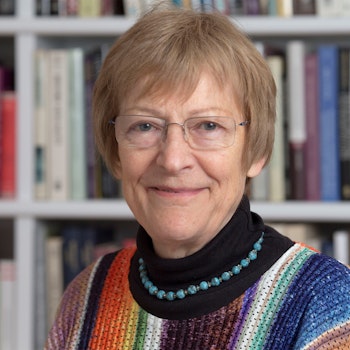This volume explores the political, cultural, and ecclesiastical forces that linked the metropolis of Byzantium to the margins of its far-flung empire. Focusing on the provincial region of Hellas and Peloponnesos in central and southern Greece, Judith Herrin shows how the prestige of Constantinople was reflected in the military, civilian, and ecclesiastical officials sent out to govern the provinces. She evokes the ideology and culture of the center by examining different aspects of the imperial court, including diplomacy, ceremony, intellectual life, and relations with the church. Particular topics treat the transmission of mathematical manuscripts, the burning of offensive material, and the church’s role in distributing philanthropy.
Herrin contrasts life in the capital with provincial life, tracing the adaptation of a largely rural population to rule by Constantinople from the early medieval period onward. The letters of Michael Choniates, archbishop of Athens from 1182 to 1205, offer a detailed account of how this highly educated cleric coped with life in an imperial backwater, and demonstrate a synthesis of ancient Greek culture and medieval Christianity that was characteristic of the Byzantine elite.
This collection of essays spans the entirety of Herrin’s influential career and draws together a significant body of scholarship on problems of empire. It features a general introduction, two previously unpublished essays, and a concise introduction to each essay that describes how it came to be written and how it fits into her broader analysis of the unusual brilliance and longevity of Byzantium.
Awards and Recognition
- Judith Herrin, Winner of the 2016 Dr A.H. Heineken Prize, Royal Netherlands Academy of Arts and Sciences
"Herrin has followed her publisher's excellent advice that she preface each piece with a generous account of when and how it came to be written. This means that, together with her general introductions for the two volumes, the reader has an extraordinary glimpse into the evolution of Byzantine studies from the 1960s onward as well as for the personal development of Herrin herself as a Byzantine historian. The two volumes are a kind of intellectual autobiography. I know of nothing quite like them in the time-honored tradition of collecting a scholar's papers. We can see clearly, step by step, how Herrin became the historian she is today as well as the environment that supported her, and through her, the field to which she has dedicated her life."—G.W. Bowersock, New York Review of Books
"Herrin delights with her unpicking of unfamiliar texts and her eye for detail."—Christopher Kelly, Times Literary Supplement
"I have often been told that scholars of other fields do not read the work of Byzantine historians because it is inaccessible or overly specialized. . . . Herrin's essays are the best possible answer to such myopia. For church historians interested in a range of issues . . . this collection of essays provides a stellar example of what Byzantine historians can contribute to several broader fields."—Tia M. Kolbaba, Church History
"[T]hese volumes are an incredibly useful research and teaching resource. They make Herrin's work accessible to anyone interested in Byzantium who lacks access to the specialised journals in which they were published. . . . Herrin's volumes offer a summative reflection of her erudition and skill as a Byzantinist over many years."—Liz James, Anglo-Hellenic Review
"Judith Herrin has been a fixture on the Byzantine academic stage for nearly half a century and her volume of collected essays is a testament to her sustained and vital contributions to the field. . . . But as engaging as are the essays, far more fascinating are the introduction to the book and the introductions to the individual essays, which offer a remarkable window through which the reader can discern not only the intellectual but the social, professional, and at times even the personal, contexts of her work. . . . We realize as we read her articles that scholarship is no less about who we are than on our conclusions about the past."—David Olster, European Legacy
"Herrin is acutely aware not only of Byzantium's place in the world, but also of its idiosyncrasies, which she illuminates by bringing into play the ecclesiastical sources in a way that few other Byzantine historians have done. Her essays reveal first and foremost her breadth of vision."—Michael Angold, editor of The Cambridge History of Christianity: Eastern Christianity
"Tracing her journey across the history of Byzantium, Herrin's elegant essays display her insightful approaches, solid methodology, and vast historical knowledge."—Christine Angelidi, Institute of Historical Research, Athens
"Herrin's essays reveal a capacity given to very few historians—the power to present the big picture without ever losing sight of the vital details. Their genesis over the course of her career, and more importantly their bearing on our current intellectual and political situation, illustrate what it means to be a humane and humanistic scholar in the last half century."—Anthony Cutler, author of The Hand of the Master
"All of Herrin's essays reveal a distinguished historian with a clear intellectual consciousness."—Antonio Carile, University of Bologna
"This wide-ranging collection of studies by one of the foremost medieval historians of this generation opens up new perspectives on Byzantium. The life experience of women and men is re-created with a view from the margins. Women at the court and in private households are restored to agency and the capital of Constantinople is seen from the perspective of the provinces. As a result, Byzantium no longer appears as a monolith steeped in unchanging ritual, but as a dynamic society that developed its own responses to challenges and so ensured its extraordinary longevity."—Claudia Rapp, author of Holy Bishops in Late Antiquity


